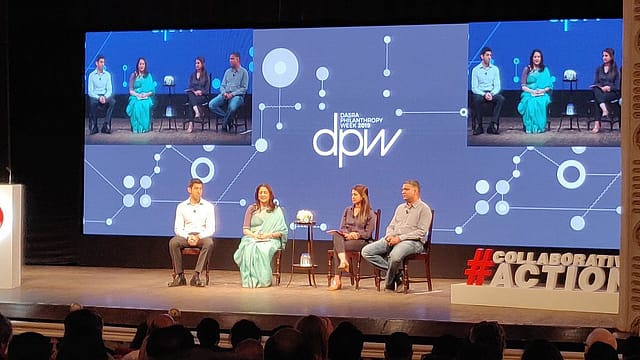Collaboration: The key to effective philanthropy
ADVERTISEMENT

India’s wealthy need to step up their game when it comes to philanthropic initiatives, and collaboration is the way to go – that was the message that emerged from various stakeholders participating in the Dasra Philanthropy Week 2019 in Mumbai on Friday.
While releasing the – India Philanthropy report 2019, Anant Bhagwati, partner at Bain and Co and director at Dasra, a foundation focused on strategic philanthropy, said India’s ultra-high net worth individuals (those with a net worth of at least $30 million) have the capacity to spend 2.5 to 3.5 times more than what they currently spend towards philanthropic endeavours. “Trickle-down economics alone will not be sufficient for India to meet its development goals,” he said, adding that India’s wealthy need to move beyond helping a mere school or NGO in their neighbourhood.
He also highlighted data from the report which said around 15% of companies’ corporate social responsibility (CSR) budgets remained unspent with the rest being spent in fragments. Bhagwati also said that collaborative action was crucial for India’s philanthropic spending to reach its full potential.
“We need a shift in mindset. Let us give without the urge to see our name on a structure or a prize. Once the urge to see ones name is gone, collaboration becomes that much easier,” he said,
Philanthropist Rohini Nilekani echoed Bhagwati’s views in her address. “Some of us need to think and act towards mass level development instead of working on incremental change at district level,” she said, adding that while embarking on a philanthropic endeavour, one must be willing to fail so as to take higher risks and go beyond the comfort zone.
Speaking on the need for collaborative action she said, “Samaaj, Bazaar, Sarkar - civil society, markets and government need to collaborate for better results.”
Women empowerment, more women in the workforce emerged as some of the top key areas, where philanthropic initiatives should be focussed on.
"Everyone talks about the need for women to be at a workplace, but no one talks about what we have done to get women to a workplace,” said Roopa Purushothaman, chief economist and head of policy advocacy at Tata Sons said at the event. She also said that stakeholders must look at building a “carer economy” which supports caregivers of children and elders. “Making these decisions of how to care for the children and elderly should not be an unregulated, household decision. It can be viewed as a larger ambitious project to set up a carer economy,” she said, adding that such a set up will empower more women to join the workforce.
Madhu Krishna, senior programme officer at the Bill and Melinda Gates Foundation laid emphasis on being gender intentional during planning infrastructure. “For years, no urban planner thought about the sanitation needs of women in public places,” she said, pointing out that the venue of the event, the famed Royal Opera Hall in Mumbai, was also in need of more toilets for women. She added that these factors play a major role in getting women to feel comfortable stepping out of their homes and going to work.
Another area of focus that emerged was access to justice for citizens across the country irrespective of region or social and economic class. Throwing light on the need to invest more towards law and justice, lawyer Somasekhar Sundaresan said, “Until someone close to us is touched by the lack of access to justice, we don't realise how grave it is,” further adding that with millions of citizens lacking access to justice, today getting justice is more like “conspicuous consumption rather than a basic right.”
Lawyer Murali Neelkantan too stressed on the need to channel more funds towards improving access to justice. “Having no rule of law is like a game of musical chairs. One person is going to be stranded at the end. That person could be you… Work on all SDGs (sustainable development goals) without investing in law and justice will not amount to much,” he said.
Meanwhile, Kaku Nakhate, president and India head of Bank of America, highlighted another area of focus. “Collaborative platforms can be useful for interventions for people with disabilities to help them achieve their full potential,” she said.